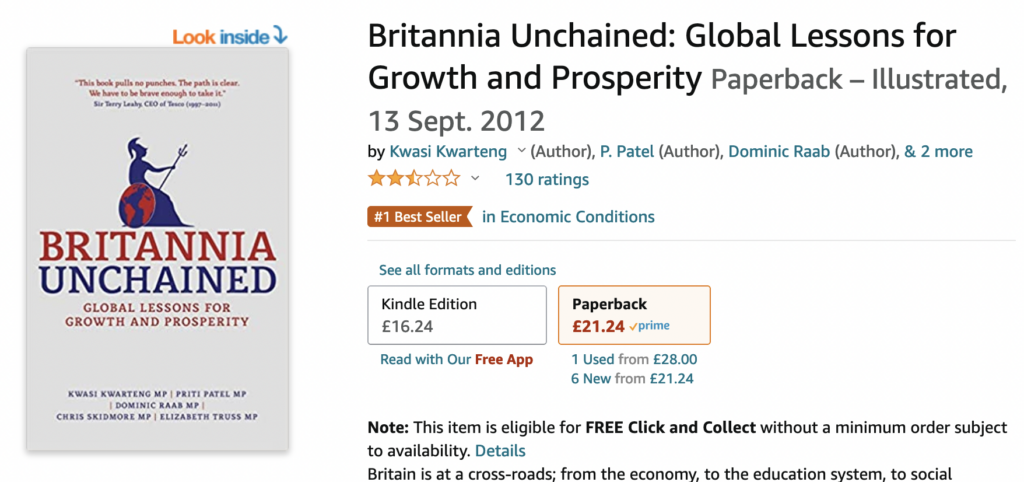Britain’s new economic policy
Yours for only £21.24. Note the co-authors.
The Washington Post observed yesterday that the book
argues that Britain had become a “bloated state” with “high taxes” and “excessive regulation” and that only by taking an aggressively free-market, libertarian stance would shake the country into powerful economic growth. In this view, Britain looks particularly terrible when compared with fast-growing Asian economies.
“Whereas Indian children aspire to be doctors or businessmen, the British are more interested in football and pop music,” the book wrote.
The authors of Britannia Unchained were, at the time, accused of chasing headlines. But as the Financial Times noted this week, Kwarteng’s other work on economic history shows an embedded distrust of financial markets and bankers that is newly relevant.
His doctoral thesis — focused on the less-than-headline-grabbing topic of William III’s decision to reissue England’s coinage in 1695-96 — argued that “the interest of the goldsmith and banker was anything but inimical to the wider good of the nation.”
Few would argue against the idea that Britain’s economy needs some sort of shake-up. The economy has slumped since the financial crash of 14 years ago, with a mean growth rate of just 1 percent for the years since compared with 2.7 percent between 1948 and 2008.
Kwarteng’s mini-budget appears to be creating a kind of supply-side economics shock therapy for Britain. The inspiration may come from America and, in particular, the U.S. counterpart to the British chancellor’s idol, Margaret Thatcher: President Reagan, who was said to be “starving the beast” when cutting back on state funding by diminishing government income.
My friend the social historian David Vincent (Whom God Preserve) noticed that the two serious actors in this drama — the Chancellor and the Governor of the Bank of England — both wrote PhD dissertations in economic history as graduate students at Cambridge. He also pointed me to Amelia Gentleman’s review of Kwarteng’s rather good book on the British Empire, about which he seems commendably detached — possibly because his family hails from a former colony of said empire and are therefore inoculated against the Imperial Afterglow Syndrome that afflicts Boris Johnson & Co.
Kwarteng’s sharpest criticism of empire, writes Gentleman,
is of the “anarchic individualism” that ran through it. “The reliance on individual administrators to conceive and execute policy with very little strategic direction from London often led to contradictory and self-defeating policies, which in turn brought disaster to millions,” he writes. There are moments where you wonder if the criticism of the inconsistent, haphazard way that Britain’s imperial rule was imposed might equally be applied to the Conservative party’s reshuffle-heavy rule of the UK over the last decade.
You do indeed wonder.
Quote of the Day
”Malcolm Muggeridge, a garden gnome expelled from Eden, has come to rest as a gargoyle brooding over a derelict cathedral.”
- Kenneth Tynan
It’s quite an acute observation about St Mugg, who ended his days as a devout Catholic. But he was right about Stalin’s Russia, when he was a journalist in Moscow in the 1930s and many lefties and British intellectuals were unwilling to criticise Uncle Joe.
Musical alternative to the morning’s radio news
Mozart | Il mio tesoro | Don Giovanni | John Dickie
One of my favourite arias. James Joyce’s friend John McCormack used to sing it beautifully.
Long Read of the Day
Project Fear 3.0 – or the gatekeepers and the Tories
Fine blog post by Adam Tooze, who is as pissed off as I am about the current liberal astonishment at the depths to which Truss & Co will stoop. What did these commentators expect from such people? They are doing exactly what they said they would do — shrinking the state until — as a famous US reactionary once put it — they could drown it in a bucket.
Tooze is on song about this. Sample:
The important point is that in diagnosing your enemy the point is not to correct their behavior. The point is to defeat them.
You are engaged not in a pedagogic exercise, but in reconnaissance. The point is to expose who they are and what they are up to. The point is to help those of us who are opposed to them to be clearer in our judgements and tactics.
It is quite a different thing to write about the Truss government and the mess it is making as though you imagine that your criticism will make a difference, as though the aim of the game is persuasion and improvement. What I wonder do all these highly esteemed sources of economic expertise imagine their exchanges with Downing Street to be about? Who do they think they are talking to? Who, in fact, would imagine sitting down with these people to talk at all? How could you keep a straight face?
This a government of Tory hardliners trying to define the third iteration of post-Brexit Tory identity – May, Johnson, Truss. This is a government that thinks nothing of putting the Northern Irish agreement in play. When they gave away 45 billion to those on top incomes, they were under no illusions. They knew what they were doing. They know it will increase inequality. No harm in that as far as Truss is concerned. Will this drive interest rates up? Of course it will. They appear to relish that too.
So what, given who Truss, Kwarteng et al are, what is the purpose of the drumbeat of opprobrium?
Do read the whole thing.
Erratum
The Karl Popper quotation in yesterday’s edition included a ridiculous typo. It should have read:
”The belief that one can start with pure observations alone, without anything in the nature of a theory, is absurd.”
Thanks to Andrew Arends for tactfully pointing it out. And apologies to any Popperians out there who were annoyed by it.
This Blog is also available as a daily email. If you think that might suit you better, why not subscribe? One email a day, Monday through Friday, delivered to your inbox. It’s free, and you can always unsubscribe if you conclude your inbox is full enough already!


